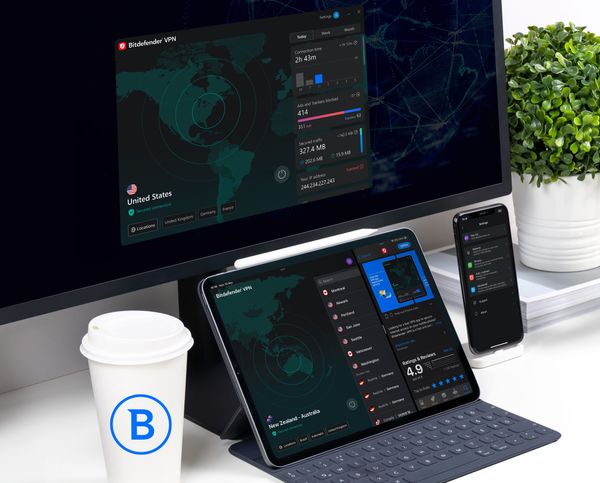Home VPN vs. Business VPN: Understanding the Differences

VPNs are well-established privacy tools that lets users access online resources anonymously and avoid unfair limitations.
They’re mainly known as home/individual/B2C (business to consumer) services that cater to the need of single users, and few know of their corporate counterparts.
Business VPNs, also known as B2B (business to business), corporate or enterprise VPNs, function on the same principle: creating a virtual private network to shield users from surveillance and data theft.
Both home and business VPN solutions have dedicated server networks and use server/client combinations to facilitate connection.
Like their home analogs, business VPNs tunnel and encrypt traffic to their servers. Despite their similarities, a few key differences set these two types of services apart.
|
|
Home VPN |
Business VPN |
|
Purpose |
Personal use (anonymous browsing, public Wi-Fi security,
bypassing geo-restrictions) |
Corporate use (protects company network, allows remote
workers to access company resources, secures Internet traffic) |
|
Number of users |
Single/household users |
Designed to meet the needs of several or all company
members |
|
Account management |
Each user has full control and ownership of their account |
Accounts are managed centrally, usually by the
organization owner |
|
Dedicated servers & IP addresses |
Users typically share servers and IP addresses but can
pay extra for dedicated IP addresses |
Business users benefit from dedicated servers and IP
addresses (don’t share servers with other organizations) |
|
Maintenance |
Low maintenance requirements, keeping software up to date
is usually enough |
Complex maintenance; typically requires advanced cyber
security knowledge and coordination with other departments |
|
Privacy type |
Individual-oriented; protects traffic against being
monitored or logged |
Companies often monitor, log, and filter employees’
Internet activity |
|
Deployment |
Simple installation of a VPN client on the target device |
Centralized deployment; usually handled by system
administrators |
|
Billing |
Users pay for their own license |
Typically centralized billing adapted to the size and
needs of the organization |
|
Price |
Significantly cheaper |
More expensive, depending on the size and needs of the
team |
Different purposes
Personal VPN solutions, such as Bitdefender VPN, are designed to fit the needs of home users with a focus on leisure activities. They enable users to connect to the Internet anonymously, avoid geo-restrictions, bypass bandwidth throttling, and protect their data on public Wi-Fi networks.
The primary purpose of business VPNs, such as Cisco AnyConnect, on the other hand, is to allow remote workers to connect to the company network and access company resources.
Dedicated servers and IP addresses
To increase anonymity, home VPNs allow several users from different locations to share the same servers and IP addresses. Assigning the same IP address to multiple users reduces the chance of singling out individuals and revealing their identities.
Furthermore, B2C VPNs regularly cycle IP addresses, which means the same server may have different IP addresses at various times of the day.
On the contrary, business VPNs offer dedicated servers and IP addresses; each business user is assigned a particular, static IP address on a server. Dedicated, static IP addresses help with user management at the company. Network administrators can configure private gateways, monitor devices and gateway connections, and manage lists of users and IP addresses.
Furthermore, not sharing the server with other organizations ensures better performance.
Different types of privacy
Personal VPN services are designed to protect the privacy of individuals. When you connect to a personal VPN, your traffic gets encrypted and re-routed through a private network of servers. This prevents snoops from intercepting and monitoring your traffic. In this case, only the VPN provider can see the data you relay through your connection.
Business VPNs also protect privacy but focus on the company's needs rather than on the individual. They still encrypt traffic and route it through private servers, away from prying eyes. However, most companies monitor, log and filter employees’ online activity while connected to the enterprise VPN, making them unsuitable for leisure-related online activities.
tags
Author

Vlad's love for technology and writing created rich soil for his interest in cybersecurity to sprout into a full-on passion. Before becoming a Security Analyst, he covered tech and security topics.
View all postsRight now Top posts
How to Protect Your WhatsApp from Hackers and Scammers – 8 Key Settings and Best Practices
April 03, 2025
Outpacing Cyberthreats: Bitdefender Together with Scuderia Ferrari HP in 2025
March 12, 2025
Streamjacking Scams On YouTube Leverage CS2 Pro Player Championships to Defraud Gamers
February 20, 2025
How to Identify and Protect Yourself from Gaming Laptop Scams
February 11, 2025
FOLLOW US ON SOCIAL MEDIA
You might also like
Bookmarks








